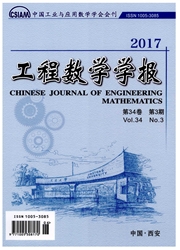

 中文摘要:
中文摘要:
本文在连续时间模型假设下,研究股票价格波动率具有模型不确定对投资者的最优消费和投资策略的影响。首先在股票价格波动率具有模型不确定的条件下,建立最优消费与投资问题的随机控制数学模型,得到了最优消费与投资所满足的HJB方程,并在常相对风险厌恶效用的情形下,获得了最优化问题值函数的显式解。其次当波动率具有模型不确定时,得到了含糊厌恶的投资者是基于股价波动率的上界作出决策的结论,并给出了投资者的最优投资和消费与含糊对冲需求。最后在给定参数的条件下,对所得结果进行了数值模拟和经济分析。
 英文摘要:
英文摘要:
This paper studies the effect of the model uncertainty of stock price volatility on an investor’s optimal consumption and portfolio with a continuous-time model. Firstly, a sto-chastic optimal control model for the optimal consumption and investment decision problem is established under the condition of the model uncertainty of stock price volatility. Secondly, through the HJB equation of the optimal consumption and portfolio, an explicit expression of the valued function of the optimization problem in the case of constant relative risk-aversion (CRRA) utility is achieved. Thirdly, we get that the decision-making of an ambiguity averse investor is based on the upper bound of the stock price volatility uncertainty, and discuss the investor’s optimal portfolio and ambiguity hedge demands. Finally, by the numerical simulation the economic analysis of the results is provided.
 同期刊论文项目
同期刊论文项目
 同项目期刊论文
同项目期刊论文
 Existence and uniqueness for solutions to fuzzy stochastic differential equations driven by local ma
Existence and uniqueness for solutions to fuzzy stochastic differential equations driven by local ma On solutions to stochastic set differential equations of It^o type under the non-Lipschitzian condit
On solutions to stochastic set differential equations of It^o type under the non-Lipschitzian condit Empirical likelihood forheteroscedastic partially linear errors-in-variables model with -mixing erro
Empirical likelihood forheteroscedastic partially linear errors-in-variables model with -mixing erro Empirical likelihood forsemiparametric varying-coefficient heteroscedastic partially linearerrors-in
Empirical likelihood forsemiparametric varying-coefficient heteroscedastic partially linearerrors-in Optimal control of Markovian switching systems with applications to portfolio decisions under inflat
Optimal control of Markovian switching systems with applications to portfolio decisions under inflat Optimal consumption-leisure, portfolio and retirement selection based on alpha-maxmin expected CES u
Optimal consumption-leisure, portfolio and retirement selection based on alpha-maxmin expected CES u Optimal control of uncertain stochastic systems with Markovian switching and its applications to por
Optimal control of uncertain stochastic systems with Markovian switching and its applications to por Non-contact of solutions to stochastic differential equations driven by semimartingale with non-Lips
Non-contact of solutions to stochastic differential equations driven by semimartingale with non-Lips On small time large deviation principle for diffusion processes on Hilbert spaces under non-Lipschit
On small time large deviation principle for diffusion processes on Hilbert spaces under non-Lipschit Properties of Solutions to Stochastic Set Differential Equations under Non-Lipschitzian Coefficients
Properties of Solutions to Stochastic Set Differential Equations under Non-Lipschitzian Coefficients Optimal consumption-leisure, portfolio and retirement selection based on a-maxmin expected CES utili
Optimal consumption-leisure, portfolio and retirement selection based on a-maxmin expected CES utili DYNAMIC PORTFOLIO CHOICE UNDER THE TIME-VARYING, JUMPS, AND KNIGHT UNCERTAINTY OF ASSET RETURN PROCE
DYNAMIC PORTFOLIO CHOICE UNDER THE TIME-VARYING, JUMPS, AND KNIGHT UNCERTAINTY OF ASSET RETURN PROCE 期刊信息
期刊信息
